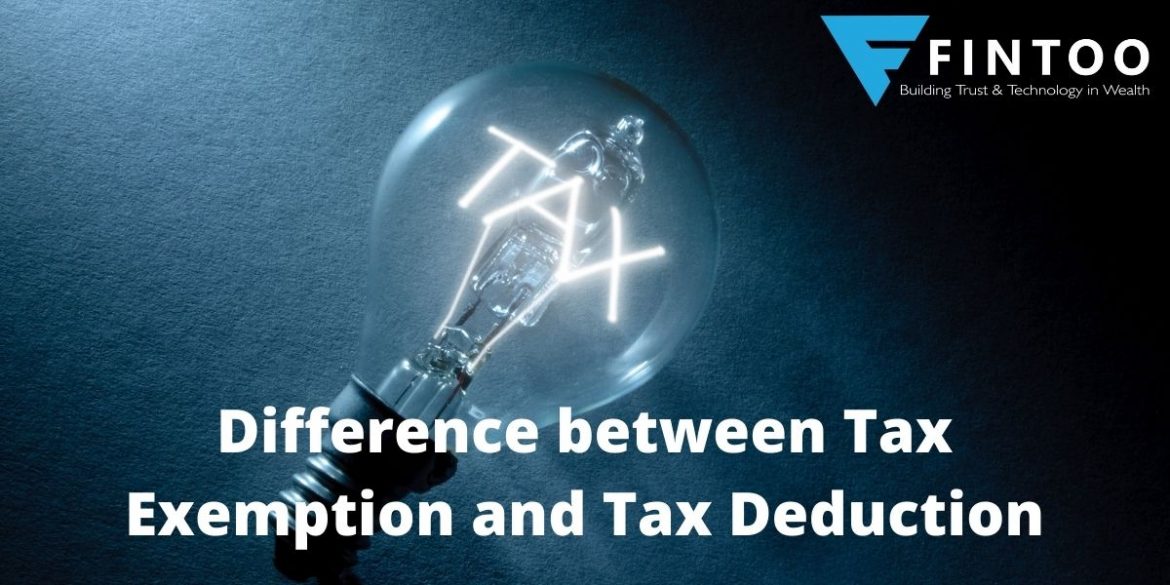

With the tax return filing season around the corner, many of you must be planning your taxes or reviewing your tax status. After putting so much effort in earning money, who likes paying taxes on their incomes?
No one does, right?. But, like it or not, as per the current tax regulations, if your income is anywhere above Rs. 5 lakhs in a financial year, you would have to pay taxes. However, income tax regulations are not so bad after all. They allow you to lower your tax liability by various options. It is because of these options that everyone plans their taxes to make most of it. Everyone wants to avail the maximum reduction in their tax liability. Tax exemptions and Tax deductions are two such options which allow lowering of your tax liability.
Tax Exemptions and Tax Deductions
To most of the people, these two terms sound similar. But they are not. Meaning and usage are completely different.
Most of us substitute tax exemption for a tax deduction and vice-versa due to lack of technical knowledge. They are, after all, getting a reduced tax liability. So, why bother with the details?
Let us now understand that Tax Exemption and Tax Deduction are two separate terms with separate tax treatments. Thus, knowing their difference is necessary.
Before moving on to the differences, it is important to understand the various heads of income as per income tax act. There are 5 sources of income namely:
- Income from Salary
- Income from House Property
- Profits/ Gains from business or profession
- Capital Gains
- Income from Other sources
An individual can earn income from either one or two or all the above heads of income. So in order to ascertain the total income an individual earns, we need to total the income from all the sources whichever is applicable. This total is called Gross total income.
Now that you have understood the concept of Gross total income, we will move on to see the meaning of Tax Exemption and Tax Deduction.
Tax exemption

Tax exemption can be an income or an investment which is not taxable. These incomes or investments pertain to a specific head of income and can be claimed from those heads only. After deducting allowed exemptions from the specific income head, the different heads of income are totalled to arrive at the gross income.
For instance, under the ‘Income from salary’ head, you can claim an exemption for House Rent Allowance (HRA), Leave Travel Allowance (LTA) and Leave Encashment. After these exemptions are availed, the taxable portion of ‘Income from Salary’ would be obtained.
Tax exemptions can also be termed as tax free incomes. For eg, interest income of PPF, Maturity/Death benefit from life insurance policies. In short, incomes which are not taxable in the first place.
Read More :- How to Check Income Tax Refund Status Online?
Tax deductions

Now let us see what are Tax deductions. It also lets you lower your tax liability. Once you compute your gross total income, the Income Tax Act allows you to deduct some amount from your income. So that your income reduces and thereby reduces your tax liability.
This amount is based on certain investments or expenses you make in a financial year as per Income Tax Act called Deductions. Allowed deductions can be found in Chapter VIA of the Income Tax Act. This chapter contains sections 80C to 80U.
Common examples include life insurance premiums, health insurance premiums, ELSS investments, PPF investment, Repayment of principal component of home loan etc.
Moreover, there are certain other deductions available from a particular head, like standard deduction from salary income, Interest paid on home loan from “Income from house property” which help in lowering tax outgo.
Tax deductions are deducted from the gross total income or individual head to help save taxes.
Now let us compare the two –
Exemption Vs Deduction
- Incidence
Tax exemption – The allowed exemptions are not included in your taxable income. They are deducted first to arrive at your gross total income.
Tax deduction – Deductions remain clubbed with your income. Once the gross total income is calculated, the deductions are deducted to arrive at Net taxable income. On this income, tax slabs are applied to calculate the tax amount.
- Application
Tax exemption – Exemptions are applied at each head of income to get the taxable amount of that particular head.
Tax deduction – Deductions are applied to your gross total income.
- Significance
Tax exemption – It consists of those items which are not taxable.
Tax deduction – Deductions are those items which are taxable but because of the provisions of the act, their taxability has been reduced.
So, though exemptions and deductions have the same goal – reduction of your tax outgo, they are different. You should know the difference to file your taxes properly. Mistakes in tax filing can lead to penalties and unnecessary hassles. Though they sound technical the concept of exemptions and deductions is not complicated. Just a little understanding is all you need. So, the next time you file your taxes, know which items are exemptions, which are deductions and how they differ.
Disclaimer: The views shared in blogs are based on personal opinion and does not endorse the company’s views. Investment is a subject matter of solicitation and one should consult a Financial Adviser before making any investment using the app. Making an investment using the app is the sole decision of the investor and the company or any of its communication cannot be held responsible for it.
To Invest and keep regular track of your portfolio download: Fintoo App Android http://bit.ly/2TPeIgX / Fintoo App iOS http://apple.co/2Nt75LP
Related Posts
Stay up-to-date with the latest information.


